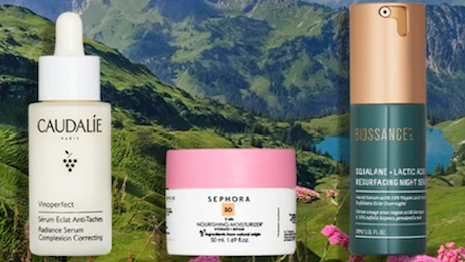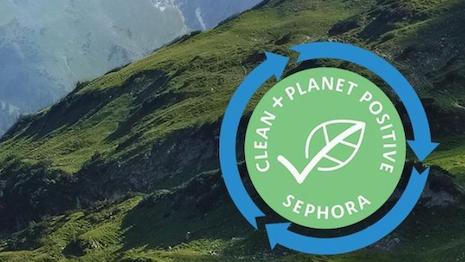LVMH-owned beauty retailer Sephora is expanding on its sustainability efforts by introducing a new Clean + Planet Positive label for brands that meet certain clean and environmental standards.
Building off its Clean at Sephora program, the new Clean + Planet Positive subcategory includes brands that aim to change the beauty landscape and the planet. To earn the Clean + Planet Positive seal, brands must be Clean at Sephora-approved and must prove efforts toward sustainable sourcing, responsible packaging and donating to environmental causes.
Clean + Planet Positive
By introducing the Clean + Planet Positive label, Sephora is ensuring a product uses clean ingredients, is committed to the climate, sources sustainably, uses responsible packaging and gives back to environmental efforts.
Clean at Sephora-approved products are formulated without phthalates, formaldehyde or formaldehyde releasers, oxybenzone and octinoxate, hydroquinone, triclosan, coal tar, methylisothiazolinone, insoluble plastic or micro-beads — ingredients that are known or suspected to be potentially harmful to human health and/or the environment.
Sephora is further emphasizing sustainable beauty
The “formulated without” list does not guarantee 100 percent “free-from” since trace contaminants are possible. It is not the intention of Clean at Sephora to test for trace contaminants or guarantee 100 percent free-from, but the company encourages its brands to engage in thorough contaminant testing of raw materials and final formulas.
To earn the additional “Planet Positive” distinction, brands must meet at least one of the following climate goals: carbon-neutral operations, greenhouse gas emissions reduction, or corporate office and owned or leased operations powered by 100 percent renewable energy.
Additionally, brands must be cruelty-free, using only sustainably harvested palm oil and mica, not using micro-plastics and up to Sephora's CBD standards.
Brands must reduce, recycle and reimagine the way they package, meaning single-use items and unnecessary materials are prohibited. Sephora suggests brands should innovate with refillable components, post-consumer recycled content (PCR), biomaterials and plant-based ink.
 So far, 18 brands fashion Sephora’s new Clean + Planet Positive label. Image credit: Sephora
So far, 18 brands fashion Sephora’s new Clean + Planet Positive label. Image credit: Sephora
Finally, “Clean + Planet Positive” brands must donate at least 1 percent of profit to a high-impact, long-term giving program that is multiyear and ongoing or be a Certified B-corporation.
The Clean + Planet Positive initiative launched on July 22 with 18 brands, including: Youth to the People, Biossance, Caudalie, Sephora Collection, Farmacy and Tata Harper. The Clean at Sephora initiative also now includes more than 75 brands.
Sustainable beauty
As consumer interest in environmentally-friendly brands continues to grow, beauty companies are shifting business strategies to become more sustainable.
Beauty group Estée Lauder Companies unveiled new sustainability goals in January, specific to its travel retail unit.
By the end of the fiscal year 2023, the group plans to achieve net-zero carbon emissions for transportation to travel retail customers.
In terms of packaging, plastic film-wrap will be removed from travel retail exclusive (TREX) outside cartons by 2023 and TREX paper cartons will be responsibly sourced with FSC-certified board by 2025.
The removal of film wrapping alone will eliminate an estimated 54,000 kilograms of plastic waste — the equivalent of 5.4 million plastic water bottles (see story).
In March, French cosmetics brand L’Occitane en Provence surpassed its biodiversity objective set in 2016 that aimed to protect 1,000 varieties and species by 2025, a feat achieved as the result of maintaining its dedication to the preservation of biodiversity.
The brand also credits strengthening its relationships and fair trade with its partners and suppliers of its natural raw materials.
As of 2021, the cosmetics brand has succeeded in protecting and promoting 1,149 varieties and 513 disparate species of plants. Now that the objective has been met, the brand is seeking out a new and even more ambitious goal to be reached by 2025 (see story).
{"ct":"yMR5pp0U186rLSWUSfMXqRmF3cAR7FnvKDw+uRAFJRuhMbf1JTApQOUDuqe3nj1lXx3uH\/SZgUETlO\/CQXkvhmuR8nEcpwsoOOw8vEu\/N5nNzGgTXOu8SSfL\/ly1vcG8DGM2SfuEpbuJteYgvHqx0oplLgfygQ\/X7ews1TWhjk+HueONxJMItUno\/2QLHc6z+s0sZQ9Rm2q02umVV252nNpe+B5mVK6NJdPFbgXV1jD4u2+mcc+8U35W7EjsocyheCZL0ZG7ifMlaLNsRBx317Ib7YEVGWWsAOn4RwlmCZR6DdsFYXw1VWg4cdkiV38Tvwk7flrCQ8oFDG2lV0h9MC0z0VG3XfOkz1HlqlHHLxTFRWkNBV120S1D4qYlMJbo5uviUHGOq4KeXldjTWlHZ\/+0tzBcrGZDRZdAtmUxW7n5pxrWmQiRyyEiqS7HW67q6Vx6sTxMN\/A+KvHcdfCdhaVH+tNzhoJlj+jnj9ItH2yb6fP573Nff5UEzRZTQQcPr\/F68gqcijDfz1c6RV7H0iE3Cf1d4nLcwd7I1G9vXUPRR5eOWW1gj\/WO83krw3MBKAnNS8FUNHzPQfKX2aVWhbyR0G+jyPHvqHxs2OjbBTybKMp+XDz5uHZVdIjnnT8hi7XXoYmG7rP4XjwfZB7vN1JNRSLIk38wFvj+y3s9h6rHJ\/rIVaTGj5Q19ERxOJOurhIEp52EYR9jXanqVL3OyqnYoec6iYqC41Kl1nXy6LkSy8kHu8fIW0ldScXRsGEZWg0tIOcbDcg1EBaD7AAk8eI+xUz3dmAHhCUKhOC4hm1MWfwFiYG5KXzE2eirSc0qQsbjPRH0BMSAZ5EuG6FWLqK+PJspJ2quYcb3jfMxFpZhV\/qXZtF+ZQR2XtiyVGpEp1Vn5Ri2+7RqswRBy7RQ9K4o5szsDcpkiN+NDVf2YcWrmp7JB5O9PfuqnmqBW25c5UD3duyr6ZWw9CdXkH18LdYccX+bCZFqx9Rfu3rMopCzRr4XvweNU0gg7F3TIlII+3DVwYKlmgx3+EzMYBXyocpkaiKRKtngC80sZFkVNiphWCKaTZz8\/T9RwnNq+cfrme0e0e0WkQ\/TRs1UeORI6A6PSuSHw6STQaSOteQeARswmM1NvSuuGBEg\/XpKRe2g8Q5qgak85TTz2dS1oLbnioAQgRpc6sswc8lfut4UTVryIKIYckRIlqEF\/G89yTg0+DWvnwts\/2v0MVQG+2GuULYoZKOy8xX9AXK7GNIibTp3G6vaPYneJyElioIKc4Iu+mLxvBGH1elDP\/oPqIpZNLHJXpKXkMIBTjQi\/tQm8y+rcWBsiF4M4g7hKPH31nlCG9Vl+qk0Anhqo10j\/8dIgF2lCQYzRGbpi+nm+AtTlK\/jyFI2eYb0pyydpYUgFQuAPLyv6iSQNM3vPnPOdTo3EoqbCXz9DEjvhNy2HUkj7JV5\/CWZq+0r5tHVgLG8UGpYL6jKSVV57gKAXk\/54FhF+2lGlw7MHHjh8cS84sb7F9Hyx\/QSto2Ha2ueyzZ1XuB+TdtKp\/24Omr0h2ZAONTX6sRXHXEVfI0Qcx8zxMtPf8CJovHZFbt+8gUVM3rdOWFPe4czwZnyEXsMjf\/AZCI3VLJ7WSMOeDw\/OM3jmFteze3M2t9B\/Ny24JLRnvVG5NNAVL8EkmesyNI8x6rrVMyYhsBJ02\/uh8WOULJsdYZ39DHzvP3TB7FUOESyQZTa4FmhWoXbZmO4o4TOwBtx84kob0ggq1DOtKx5OvZ3f+Y+f4ltOw0Zog3ftWsVPWjqDoUwvYxy1Iu+DyQZaJNLmno\/PPA7W\/EODT3CfK3ij6X1sNwDDR9UjiX6z94HL48vYFQwTNTvyd8OUV4DkYGs6KR1Hn\/owKNG0r19M0CWJ9+HYLaQvwHuNhep7tPeQOxk1gFcGjzNVEq3v76CSJOyhzVUBrcG0IlJc45S1wXn0qcj0mCiYQsKIPRuLr5BcNNCBg\/0KFD\/\/ZPr6ji0YcNHhWVC1WSOy9ox4kd3tPf4PDjrdCj1vqCC3mNFctBOiprBy8R4koFfz14xoIR1iyRmnM33YUPK7Ff6I8EB12xGMPqE5rsn0Vzl\/nVs+grDFriW7s7H8kvUmOV8kPtlCmTvOrHJWZPHbfqjbygocRJbibWlQ1kD0sPItJPOqcQ8JIKFrkntkp5LW+LG88gVLTxq+FopYYKzCBqpe1U38hdomvqENiP9kf+2tNCy0nsGkc+cMFzzA1N+JuQn6BKmhDKYyEWpOhVmIb7k+9GSlRPV5kqVX0mNSeCspHRHEO7P9A0IG8IdHKu\/wnxsCn8VHFIWhgPxbZSDppLnUFm7hiP8mURZJ7uy+PnG+E78tNXCBcOC2VOK3ErHWrEWPznqbndJ+yMjRZZwUzg4h4eGSZ3Hx\/zX2Y1WpvpLSt0nRMpbaawk\/WT+wCz4RhSttLjpJG88twqI\/il1FBddawRLH6Nt5fahi+OfQvIaok5HDJOaY\/odm1j0vDxDSRwHVAeIk8D9P+xDsSrboZ93RuMvxW\/Y4u3k4MsOIZFF6uHmY63NuK6IZdXN\/oz5hVoJzB+i3qiUagOQF6O4rB4kedPhpnkWlmijW0iu5QHU7MFlRz0aGSldxQgGQdwbBPjrVduNsZNU9f1d8ZiCSOoPbPCQwCDQiuODKlUUE3ZkK2L+ElpwdUA+GCe7bMl6fg15Kr7lOgORvanLpqT7hjR0P+pOEpci3M7V9kPlXoJcHLMArdKLER+KBH4PMDNy7hQ5fQwuA4H6AMkPBG0fHJcy+q32fCYHUjE49zWnBi0T7KBAuctL6hztg3KwTrCIvMxGzNIWLIX0l+u+1YhmisfLlSQCqzWT5Qzd7PgYRRDua\/Xu4MiFkJm7tZhn\/5A1\/m4G1Q+fpAf1UZODvndp0yvjDHuYIHCPKvJ5uRwo8JX7BhPuO+erxGRjrnvXT5wBoiVf\/9hV0FI8SKUfnuPdj7pyestSZ0ZU+MOV3fWzPoiDrJe7t4jffIvB\/pFaWFBsldAcYrfmAyV7GubgLgIxcOvU699UMNA36HP54rU1sW0qKkTPe\/g7NCl0vBDhQcnWQYcexmlGD0WsNquI9rR\/5DS6JfD1aY9hTEX0nI59\/rBcP\/e6k1HZECHWRBb8jk50kHvg4I84a98htzkpccT7I5dmiNgI9DSkOxqIZYnaibxH8\/vB3Yo7COYuq6ItKi8SgwbzLU\/pnuhfJDQsBNESBc68y37pT+yCQyghssyd8Yc84wkdDraub6nhoSzbCSAizeJPZp8cwA1pFLjPD85GHYirAmIr3w+eZiCDsm88ryqVsuYsBxxaofNykygo9w6TH25vC0zOhW+0d7SHXaN92wfcJy0n08p5Ql+5ERjJR668RetcnwSGbuym9WoLn7DDsiM5V0GkFyQZRXS2KvMGI0buAPbNTXpDY3tSMLlAlr1YaXrGwhoqr+MuUbGzITsZb3JELwA9eeQ\/zCaLPUU\/gy+SH9UgPjdQvghUppcZfLjSCVMOmRnDgQzHXRr7WYMovDKiCDRuuV0+I8GgKXn4OGqugOhV8RXWMnW+ucgY6Os6CZM\/KSNscoxuDuWeKnTyGrnF\/fPm6QtotojSo6r3w1wYBp9BFzIZBtZaAEBBRRYd5rQzt\/7w8P5iWEQ6A+ZpGOrRbQYSliReJCIIo88iB7m2OszHKgRE1BGTfBG8EhXV\/kIkByMZbn4EYJByutLS\/7Tv6umwft74LQLOaWTN2Olcron4+WHYCqn\/BFqidDB9ewU50x71Kc662XrlsmAfbeYDmmGLyfP829UQqwB9Mfd2Pj+tLVcjNL2goyL2wn1xICyMA+IcOfCGHKnCam2AY80OhK5K3xI6ChXs6IZgCZP8f4+Y0hYEdM4306VKRvdjyOi538omnkCmFlg3JzzdbZyGNSV2n\/s2tXhcjuQ\/fJqRtnvB1nzyrMK0SB5D9XTl4j7Z55aI3nb\/Rz6LjmLD6tO0DMDBN0wpEaABC+RRlns6Ts4aSCcZiNdOJ3xx6u2YWb9XgLHvxXgg5To5ABHZ1319mo5WZbvrBDgefUHZdU7L6ihdFF\/2PDe0LkOBZ3Io1wiK2Dd+QR+ENot\/OeIDj9y6Z\/0h1vcDbxK5Y0SViG6n7ssCwNkv2CVF4ipk3O8E6j5YplXJ1ntdBI1txCBtR33wop7pUuAGDIZHV10TUB0NiaUiyx03sEyyJsbvM3a2r7z8aXRk0xEbnFUyhk5\/4inS1IhAbiwh7MHpYcAytZWUjFFonRDnNBbHeOhSVK1NCfAreWIZR\/uJey9EoyxMcyulbkou11yY1++5V+M1s\/+TURKBgPPx4Io+kJ5MaORLFm3Ikw9uzLU8IPhl9HBUeCvWVCl25SIxWmOEa\/M\/3DCn8PLPY32LMZdkxko6opiuDkZ3ETv2ooCZFBrFZqq85PwifHtX2ac\/WZ\/Bgrv\/THC6KM1uC550eWoYEHESeCHjW1gMrTb6jLU6aCQOZ0xDDY9KQZmLGA1egpyiybOrgye0JsetolgSYeCYPg\/tTjCaRLS00T+7QB8STK6YvUXfrQT7m2uy2M94HhKdzGSj1FfIMn2IhIVzqnvOfe\/EIo0jSfWyGtPb\/QJIhed\/6YxSYVrXk4sDqmlAc28ktQpQK47zlJ\/TM5wuQkJf7EKaGFopahU5iqDhonO0+i\/MkpyE7HBPXSgx7j+SrzojTfK4EWPSOSL\/CZi5bFlBkUUw5YFh+K4OKoCiiKuLMKJnP0XvT4irkB+\/fXSAf9kdKsnS9ISGMjyj8aCt9z7vPxI7xp2QRZVGq9diEIT5ni1x1NA+A6hEXvYdn\/MNSi8DuyZXgzkZRfyLVFwaiB4ye7HZlTDBDl2PuJ5rGQkqbpY8YP7xiXFp7A8hNyEZZdQTLwd\/q4FZWa9bbij6QiY5\/9UAjaz\/OY\/cA65ddbbxV0MlzUNPJn78OS5lflPEEXQbCzK9zpuDpI0DoVIJthFkB6DaJKQpOaUjXY4vHao1Sc2RR8eOoOS+nIIbe16OKTb0Ja6B5vyh0MzqbFdg3nUvnK0BM45DmsQw9om5ZlR2TLbjubNSd0ypIMMpLAqEUbOco2wc17ZqP4LSxdtgMtQ4BaFBY9lFjnc6frzozcLf+XmC0zJ\/raNdcalAzkGPlLp4qq\/KxI1quXM+LD8dNC7\/v\/y+yK1mSdvwcBnbm0i0mdP6XOXjc9cqdbb9NMQXe7AdB8Y5rhUg9b2wD5JcZkOqrxYXTVeWq\/QA+nje4PcmY41o0DJky71HAOMWZ1D\/ufApj+sdeisd+C4jDhNHz0xg\/MhF6uJTLXIbGiWO2cmd2hBuBoWN4bgqe2chVPh9kqHrsVwyKG66Ox3EnJJv4sQQbnk4krj3k90Q1YiklKSXCAGROsXLIvfZrxkL1yeLxP9okAcJk0LPss8gt6mz2cjHH4GIwzb4PLDH7Dthx52tTPp\/Gf11IMfntXTjvhO0Lb1PAHB5PRAem6e5RRFFwjMzl1n0fquWp7gJotSRlc7DTv\/kdZyN9sJE22JzK1TcsDuaiI4HC3VM9opZMvI1HYFvtzaK23ZlvYjXxSIPU43dzCczemaeyBDc\/7iClProwAowmOjuHHdUQ5BVcEt3BTJeS8lkbFBSR85h\/mw6nutZjvKN1HJiKE5xf1uaNjao4S\/nIWojwcAamLAuoCj+u9DWkKrvJ35vyPJWij2hdDBzngJFFbRlFFsRvFizgsiTpxjWjwyni22QgqiV6XKjkZJKEKQAEu0fjtGcIpZSJIOn3x4Z+ZBvbIcqahhWUQ16hECi+G3I3CSp3eVPkRUIuxjihQ+GzFCk945y+fJam3tuyGgbj6+Ac0v63nzSKigunaZKqZIlFvNUkoXuuMCyswbp9zK\/fOIeW0Izd6IeYi3FGksFpbEAUhzGOU1RNHrUdRti6dX4dtSX4d6nCJsAwilmi6c74HRMMNFx7MOYmqXYvKNWlciAzGAggZYNv6Nxd7z6Pc721rPDB5+gqtFyYRoescaA7bDOPXhIHOlLZTkCii3FkMbDHrQGbL9DKIT\/EHqMxfnFZTm8grrJiVOMg70jdD9vPf\/AL5wI6F8gMG8UkjZQe6\/3pV\/yG7SozMDMcWI17B5k77uS6ax5mMSwx9QyZhAOdvnP0j4pIFycG8puqRt87EI8O2+w2QDqdaQFGUAb9wp8lZV\/zJ0GhRwmpasM87kGI2+CvcR36MNxvIz2Gh16uj5o0Mnx3Q8O7JA6TAhtyhqKLd0rT+EQr+DsnSp9rBiw1VJ0vhw\/KWPEpK63UiY+SRlRZ1cEFIfeuL3TKNZrc5QuPNjnHBt9SGqvsX\/svpSpGh0ZAyOZbAU1LyqEzhZUeKajY76+U9T89DcnE7Y+8SKL2IQSoyX2CnaWMtqgh5oh8HdzV7rYo50WTf7ldfHMfP8rrV0HtBizFM9a\/PU3hncwweHmNVnPCMGMxaY2Yag9jM3hX8SG\/\/k65xA9\/GWb+0CJs4+uVyx7dSTaBx\/\/Q7POK8bqANlDwe19WLm6ccEP+od5S5\/Xz3SXdG3iPH47fQIwd5WA9KxYz3hyMAma+2sD+7ssEaFquy4N3Y6BtIgjx1DNNs4Lm7jsmfAB3TuBXrmLcCGW8KxT\/R05Pi6fn91h\/9tfx51zOHfp+QD1TeTk94Ji1sPfhJDdai1fynIc7qOsSIhATFAMgXlwKwRUq7z0ok\/zXWY3\/jIqY0e54+oeNnqO7ovftwQhZ50trq50cBpcDZ0s+mphxjS6k8pOqPTwVXgwlUzWx5nJNbY6QFACPewCEOVU71LeDuLsAZzcBWsT96bPEBrI\/qUEqRjJRr5ToRGJK6xyIrpCXt59KYDeMlYqTBGrXEcPtaTiymq6XrQEpWuT600nH05bWmQOtiWOlQaLiNNYiK56qJSnMv3AZcw+33oY1RBIaH+sZajYb25nxIZL4Eh1FqA2ya419m2TPaWEAzzgw2XXJBHFsnD\/NnQu39oMsWuwYWVq2AbNGTy1ZhGjoU6QHP7Wg5Kcq51FSnejF8aBkS9iyIucnaZQmvvvVgKTQDRwCVX3zB6Ej6IMm2wPJ6DxAr7lp0hQaQsRHnv3r\/P2rURMMlkkDK4J9KcrIz3wbU2Aj7NzQTWu200cx\/U3nQRA6KvnAEtiPDIHuJzn5r115bWMdeqLYo8++I0SCCCEr\/F7OZyibBFSKVOLq+7dqVgGnh4JubyaDvZnKrSV+pigpD1YNwHC\/d0axLkrcHcoNnMu1oCNRj1ALfqoI9ejfn0LrQVYmT0bY6ZKonYSDRsr+JPaVsTgyeItTx7BSXoVROdIeHdFFvNanGjrQJ8QWtyPKW6DNhqZsGFbRyrwy5KUUBGMG6mx2COp6HZ14fH0f+z76W7tKuy\/OBLTgU0t3U3X\/22rXYYo9kQ80oSYXo3zJEl\/t6mgE7Wno0IsMIOcdyrkVVOAgbywCkD8fLO9nwQ6B3CfJYbTPNM+zlNisiLrGlxewC+0Rco31boea67GP4pOBO\/53tjWqQuZF2FbH7yR2Xbl4grf+zdn6xRx2v3JYHysILGGUbFpeUeNoS2BAFTTTHbFgi8tYNLjxvvTqAab84Epj47ELmpCSqydUUdJYUR7cZl8OpjlRU5wRV0+wpCmxpHzhlqlJCyI\/QC3VnWJhbgcyvYri69zGigHUyOkaZ4pCNyiOzDlGTcNwDJSpjQQmjJKw+kcBR7C+FEpVUbWC60vA54v+2tc5hTORE0CUJ1T5uNLvcmtPMzAMoa7yMVX29N+Q0t4ZOmVruxvTZXJY6Gh8XIt8pQ\/CgbopqxhrDut2eTGnxqcSlkHtBeXmzVH2dj\/A4wK1vQBN9lYXJuf4r81EQUi4k6hZr37i\/W+cf8OfHZP6PTfN2rEWibnLr5sYzpxvW+PXAvtEQxmN1+kQGvp+kfLEN38ltgfaaGcRbg9xAM1I4iGtFrTRBV9S+ix\/3DWBK8YbMln8Z9PiUDky0ophInAeBjbhoHKKnLZIF9tvM5PQyn+fjIzln84GK9smmVUhhAWd8JOu1hp7Pf64G1OXiry2u4h4WXy4M4aedx6fNloSvCg7KkeOneTqhX3PY6wfYhSwVg4hVZknSUWUuQLqRf\/oTeRv\/Alyy9TUWPJqTqev244FePtIHN6IFtr2jKrWWk8ZSu1OI3Q0pFRnihNQiZKFjUGGjbFKmb0Vu6e96hPTmf9ZLzVAVK8Khi2xcfXXT9KjjK4LtZsSiwOTl9V9pQ7itWCwTw\/K3Iz8UQN9St0GKYoVk1Bh9OdS58iInuVqL0MD+0u9l4vQUpEU+IhErT\/vm3Bc7Ab+FtFGTiY2a7ggD764vl+OYPwWq10IKWxnG0HPsdpqDGxMO83Fd\/wcuSLJONh3DweVBhtMsTyescboJ0b17WXBrmEMLKm0D6FMXMOYFfzHhyp+\/rQGh0Iqgef6ZTngUrUy1pDDCCBpbgLV3U+XuTmHxj7PqJuqV\/MI0jlAsPKwEAiOD53+eNquQwnfzQN1wyIAnXtjRXywqTs2Fzp9xHnBZOhJSC0UjyAFtlU5exV9FMDNoRCWftnzhqE5ABB\/mu98Hal\/vCKXG\/KmscYk55tgeFNdqn9wYB1LtROQN5rlytBNUXyyRp0GXPzBwcwHZUGHfuyga30BpqP1AH0tmXjjLl8A6NrxmTwIesKl0mWWJYmsMPZPltHvmTB81ePvvcYfZvUoQ7bJ6mVPmgYr0Hs+tCHPXu9zMpZIBQpqN0K6+3Unh40geuiz253PZ2\/qrc1f\/8EPCnDwxY3vvZQ48uNlnP6yPUH5TPQNbT1cmRraxxOUFg8x1BOREp7Q0s3QqWkIO6sJFcrmOghtg8e8rgTQGiLTjaH4eT+FqL83o5BVgAa\/LVqcZOl2vMHUyrTd+fQB\/iZMdHhvi1cljYgo3kLJqrKjmnU4R9rqndRpLlqfBJxkI4i+jxE8haK8zvQm86dZVxHfsiUKji1p0cbJT2LhlRMHVDjbG57z4TXNsU7AWTia235kmJLkvLa1JOj0n2RhAJ9FD0hL4+sPdz1TcxEbGtjQfEBfCat7wbuWHqpeBx35oJrVor9eN\/sVVS803ppoARfrhvfwCKn0TxvQo0tEjhnxVBFQP72kLKLsqwOOLRRFJD6LIMWptCBc5K6y3RD6yWsjppKqUHc\/07QPfIV\/0DU15hFcGnfHjdUoQWzLBuwNo8b2opYzXg2xDTdVqb0LSwS6HHCY6sc5gcKkTwG56NCvo3yYs6PJ8DBiTLNmDDVzzMjKSaABQnDT7hzk8U2tm+jrKYmq8uqEZpQ+tyMX7HLsfyGcEuPt7\/Xy2Y1wimzv\/Oc3ej2GwsksVsxEEe6EIGxEcD6NSZUeAtULCXBCWxrhvoesCIs4BBW\/y5wTlGJoYQvLExmJ7YhAz0M1mkak9or\/efzRz2HAYWAQ+kEOkEPcAw6c7arNR13E6rgGDN68cR8pVE1kLrbS+kPT9bOjfShOlJe2NIVPMTPdAtq7goGwmOE0gpJ3ly1u+ekJbLa5qkMUAd0h0ugtvDePKwP5vMoPcjmJsSi3BAEwsnraag8I7rxU5tLdzVKKh9JtAQhuXJlu2tLpPVpKheczlPurS\/IONYo9Idqwy0KyyERB1wQroh0fVQ4d9nffjbZpxNq0Q1Zeuvocbes+X98RpYQQ0MSeMLDu+Hh\/Rd6y60dS0hQXHCSLGB8x6p\/RUFStzKhIpdcOXv8Ulc2pvmWduTpqsFC30SjaAL\/\/QGeJ0Vg8efZWHAbs1F43cXK","iv":"6644c3ef70922162021a05291bbdbc7f","s":"39fc70e50778b22f"}

 The new Clean + Planet Positive ensures products are made with clean ingredients and that brands are actively working towards bettering the planet. Image credit: Sephora
The new Clean + Planet Positive ensures products are made with clean ingredients and that brands are actively working towards bettering the planet. Image credit: Sephora  So far, 18 brands fashion Sephora’s new Clean + Planet Positive label. Image credit: Sephora
So far, 18 brands fashion Sephora’s new Clean + Planet Positive label. Image credit: Sephora